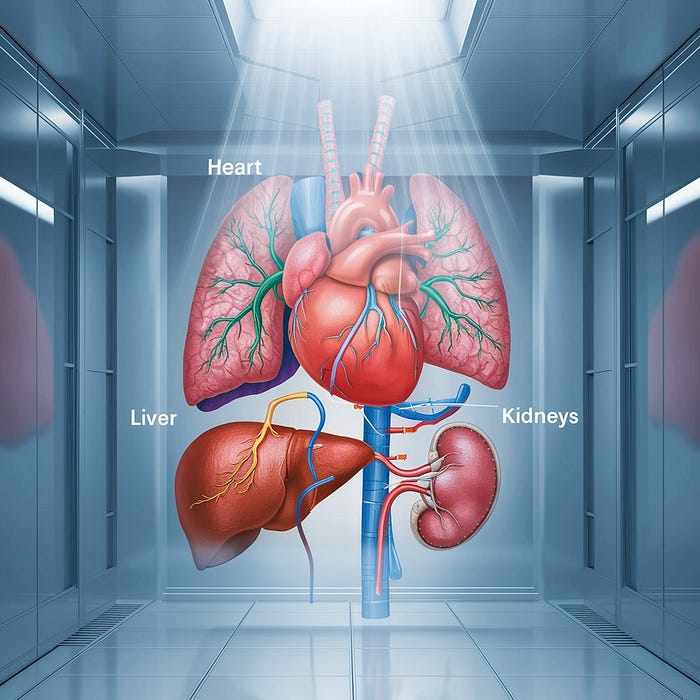
Introduction
Maintaining good organ health is crucial for overall well-being and longevity. Your organs work tirelessly to keep you healthy, so it’s essential to support them with healthy habits. In this article, we’ll explore simple and practical tips to help you maintain good organ health.
Stay Hydrated
Benefits of Hydration
Water is essential for every cell, tissue, and organ in your body. Staying hydrated helps your organs function optimally, aids digestion, flushes out toxins, and maintains healthy skin.
How Much Water to Drink
The general recommendation is to drink at least 8 glasses (about 2 liters) of water daily. However, individual needs can vary based on factors like activity level, climate, and overall health.
Tips to Increase Water Intake
Carry a reusable water bottle with you.
Infuse your water with fruits like lemon or cucumber for added flavor.
Set reminders on your phone to drink water regularly.
Eat a Balanced Diet
Importance of Nutrients
A balanced diet rich in nutrients supports your organs in various ways. Vitamins, minerals, antioxidants, and healthy fats are vital for maintaining organ health.
Foods for Liver Health
Leafy Greens
Leafy greens like spinach, kale, and arugula are packed with antioxidants that help detoxify the liver and reduce inflammation.
Berries
Berries such as blueberries and strawberries are high in antioxidants and can protect the liver from damage.
Foods for Heart Health
Whole Grains
Whole grains like oats, brown rice, and quinoa are excellent for heart health. They are rich in fiber, which helps reduce cholesterol levels and improve heart function.
Fatty Fish
Fatty fish like salmon, mackerel, and sardines are high in omega-3 fatty acids, which reduce inflammation and lower the risk of heart disease.
Regular Exercise
Cardiovascular Benefits
Regular exercise strengthens the heart, improves blood circulation, and helps maintain a healthy weight, all of which are crucial for heart health.
Strength Training for Organ Support
Strength training exercises help build muscle mass, support bone health, and can even improve liver function by reducing fat accumulation in the liver.
Exercise Tips for Beginners
- Start with low-impact activities like walking or swimming.
- Gradually increase the intensity and duration of your workouts.
- Find a workout buddy to stay motivated.
Get Enough Sleep
Sleep and Organ Health
Quality sleep is essential for your organs to repair and regenerate. Poor sleep can lead to various health issues, including heart disease, obesity, and weakened immune function.
Tips for Better Sleep
Sleep Schedule
Maintain a consistent sleep schedule by going to bed and waking up at the same time every day, even on weekends.
Sleep Environment
Create a relaxing sleep environment by keeping your bedroom cool, dark, and quiet. Avoid screens at least an hour before bedtime.
Avoid Harmful Substances
Effects of Smoking
Smoking can damage your lungs, heart, and other organs. Quitting smoking significantly improves overall health and reduces the risk of chronic diseases.
Alcohol Moderation
Excessive alcohol consumption can harm your liver and other organs. Stick to moderate drinking guidelines: up to one drink per day for women and up to two for men.
Avoiding Processed Foods
Processed foods are often high in unhealthy fats, sugars, and additives that can harm your organs. Opt for whole, unprocessed foods whenever possible.
Manage Stress
Stress and Its Impact on Organs
Chronic stress can take a toll on your organs, leading to conditions like high blood pressure, heart disease, and digestive issues.
Stress Management Techniques
Meditation
Regular meditation can help reduce stress levels and promote relaxation. Even a few minutes a day can make a significant difference.
Physical Activities
Physical activities like yoga, tai chi, and regular exercise are excellent for managing stress and supporting overall health.
Regular Health Check-Ups
Importance of Early Detection
Regular health check-ups are vital for early detection and prevention of diseases. They help identify potential health issues before they become serious.
Recommended Health Screenings
Blood Tests
Routine blood tests can detect issues like high cholesterol, diabetes, and liver function abnormalities.
Imaging Tests
Imaging tests such as ultrasounds, MRIs, and CT scans provide detailed pictures of your organs, helping detect structural problems or tumors.
Maintain a Healthy Weight
Obesity and Organ Health
Excess weight can strain your organs, leading to conditions like fatty liver disease, diabetes, and heart disease. Maintaining a healthy weight is crucial for overall organ health.
Tips for Healthy Weight Loss
- Eat a balanced diet rich in fruits, vegetables, lean proteins, and whole grains.
- Incorporate regular physical activity into your routine.
- Avoid crash diets and focus on sustainable lifestyle changes.
Conclusion
Maintaining good organ health doesn’t have to be complicated. By staying hydrated, eating a balanced diet, exercising regularly, getting enough sleep, avoiding harmful substances, managing stress, and having regular health check-ups, you can support your organs and improve your overall health. Start implementing these simple tips today and give your organs the care they deserve.
FAQs
How often should I get health check-ups?
It’s generally recommended to have a health check-up at least once a year. However, your doctor might suggest more frequent visits based on your health status and risk factors.
What are the best foods for liver health?
Leafy greens and berries are excellent for liver health due to their high antioxidant content. Other good options include garlic, nuts, and fatty fish.
How can I reduce stress effectively?
Effective stress reduction techniques include meditation, regular physical activity, deep breathing exercises, and maintaining a healthy work-life balance.
Why is hydration so important?
Hydration is crucial because it helps your organs function properly, aids in digestion, flushes out toxins, and keeps your skin healthy.
What are the consequences of poor sleep on organ health?
Poor sleep can lead to various health issues, including heart disease, obesity, weakened immune function, and increased stress levels. It’s essential for your organs to repair and regenerate during sleep.


Disclaimer
This article may contain affiliate links, which means I may earn a commission if you make a purchase through these links. This comes at no additional cost to you and helps support the content I create. I only recommend products or services that I believe will add value to my readers. Your trust is important to me, and I assure you that I will only promote products or services that align with the topic and quality standards of my content. Thank you for your support!


No comments:
Post a Comment